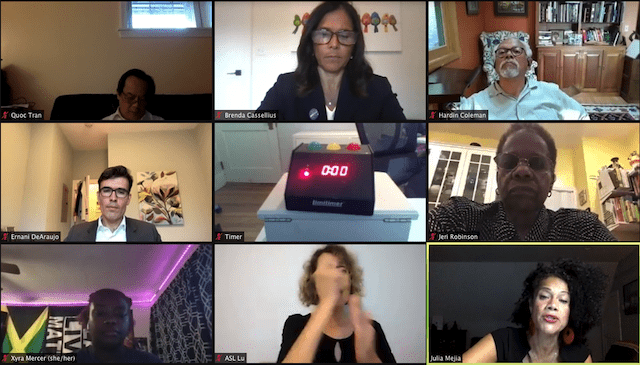School Committee approves change to exam school admissions
Admissions will rely 100% on tiered system

The Boston School Committee voted last Wednesday in favor of a new policy for entrance to the city’s three exam schools in which students will be selected from eight tiers, divided by socio economic factors including income of families in a student’s census tract, the number of households in which a language other than English is spoken and the educational attainment of individuals in the tract.
The unanimous vote came after a group of white and Asian parents and white city councilors pressed the Exam School Task Force to propose an alternate system under which 20% of the seats would be exempted from the tiered system.
Boston Public Schools Superintendent Brenda Cassellius, however, did not advance that plan to the School Committee for a vote.
NAACP Boston Branch President Tanisha Sullivan, who co-chaired the Exam School Task Force, said the new system will be more fair than the previous admissions system.
“Our goal since the outset of this process, dating back to last summer, has been to promote equitable citywide access to our exam schools and to ensure that the educational experience of all students is enriched by social, economic, and geographic and racial diversity,” she said. “I believe tonight’s recommendation achieves that goal.”
Under the new system, students will need at least a B average to be admitted to an exam school. For the 2022 school year, admissions will depend 100% on grades for the first two terms of 6th grade for students entering the 7th grade, as there was no test administered.
For 2023, grades will account for 70% of a student’s score and an exam in English Language Arts and math will account for 30%.
Students living in BHA housing or experiencing homelessness will have 15 points added to their composite score. Applicants attending a school where 40% or more of students enrolled are from economically disadvantaged families will receive an additional 10 points.
Cassellius said using the socioeconomic indicators in schools will help correct for the disadvantages students in such schools face.
“When you have concentrated poverty, it often is synonymous with a school that is hard to staff as well,” she said adding that low poverty schools tend to have more experienced teachers.
Prior to the vote, parents, exam school alumni and current students testified in favor of and against the proposal.
Testifying in support of the tiered system, at-large City Councilor Julia Mejia said the new system would give students growing up in poverty a fair shot at entrance to the exam schools.
“This is our opportunity to seize this moment to do what is right for all students,” she said.
Also testifying in support were Boston Teachers Union President Jessica Tang, state Rep. Russell Holmes and District 6 City Councilor Ricardo Arroyo.
Testifying against, Dorchester resident Darragh Murphy blasted the Task Force members, alleging that they harbored prejudicial views of Asians.
“All of the proposals we have seen from this task force make it obvious that the intention of the superintendent’s group is clear — single out Asian American children and kids from undesirable neighborhoods and zip codes and make sure they have a statistical chance of about zero to gain admission,” she said.
Murphy urged the School Committee to delay the vote.
While at-large City Councilor Annissa Essaibi George did not testify during the hearing, she advocated delaying the vote in a series of Twitter messages.
“With school committee members missing, an interim Mayor who was not elected, and a school year of chaos and uncertainty, this process was a hasty one,” she wrote. “While the plan claims to level the playing field and create improved access, it has not. It is unclear, untested and not informed by families across the city.”
The admissions policy in place until last year relied on the ISEE test, which accounted for 50% of a student’s score, and a student’s grades. That system was thought to give an advantage to families who spent heavily on test prep services and to students who attended private schools whose curriculums are better aligned with the ISEE.
Last year because of the pandemic, BPS did not administer an exam, but instead selected students with the highest grades in each of the city’s zip codes, allocating more seats to zip codes with lower incomes and higher numbers of BPS students.
While white students in 2020 made up 40% of those invited to exam schools, they made up 24% invited this year. Just 14% of the total number of students in the BPS system are white. The percentage of Asian students admitted to exam schools dropped from 14% to 11%.
By contrast, the number of Blacks invited to exam schools jumped from 16% to 30%. The number of Latino students increased from 24% to 28%. Black students are 30% of the BPS population. Latino students are 42%.
Projections for the tiered system in the 2022 school year predict admissions outcomes similar to those achieved last year.







